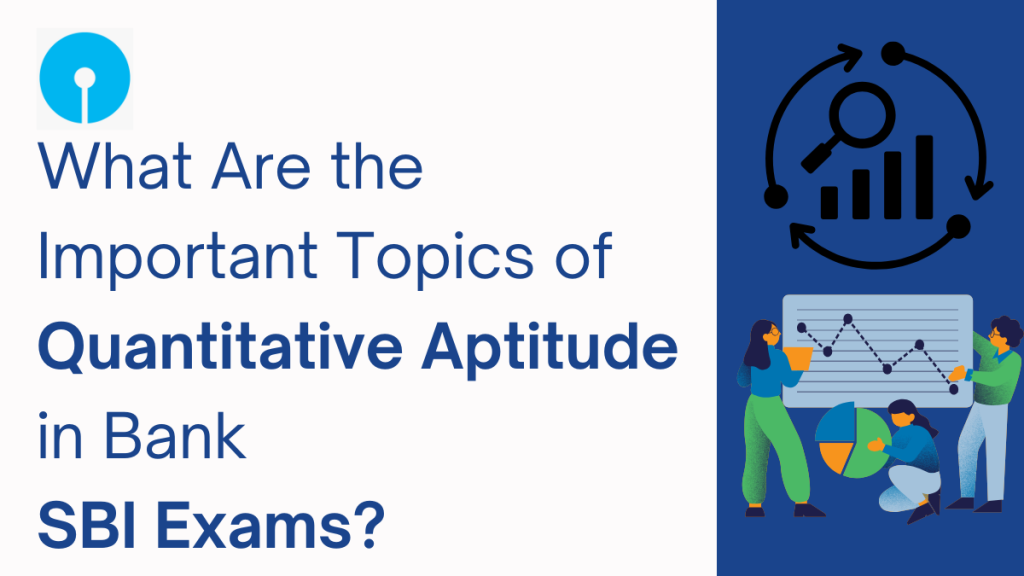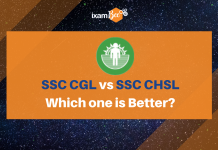The Bank SBI exams are among the toughest and most sought-after banking exams in India. Therefore, as per this, aspirants who wish to get a job in SBI or one of the leading banks like Indian Bank have to excel in several sections, including Quantitative Aptitude. This section is really important in determining your overall score and chances of getting selected.
In this blog, we will discuss the most important topics of Quantitative Aptitude that you must focus on to clear the SBI exams. We will provide you with tips, examples, and tables to learn better.

Why is quantitative aptitude important in SBI exams?
The Quantitative Aptitude Section tests your problem-solving ability, mathematical skills, and logically sound thinking. For SBI and Indian Bank exams, this section checks whether or not you can handle numbers appropriately and solve real-life banking issues effectively.
A good score in this section can significantly boost the overall performance. Since it is scoring, with a bit of consistent practice, one can excel in it and hence increase the chances of clearing the exam.
Key topics in quantitative aptitude for the SBI Bank exams.
Quantitative Aptitude is the most important section in exams like Bank SBI and Indian Bank, and among all of the topics that one has to deal with in this exam, the most important ones for cracking are Simplification, Number Series, Data Interpretation, Arithmetic, Quadratic Equations, and Probability along with scoring good marks without errors and at a better speed.
1. Simplification and Approximation
Importance : These are very important topics and often come in the preliminary exam of SBI and all other banking exams.
| What to Focus On | Concept | Example | Solution | Generalization |
| BODMAS Rule | Apply the order of operations: Brackets, Orders, Division/Multiplication, Addition/Subtraction. | 12×15+12180 | 180+15=195 | Follow the hierarchy to ensure correct calculations. |
| Basic Arithmetic Operations | Fundamental operations such as addition, subtraction, multiplication, and division. | 25+30×2 | 25+60=85 | Simplify complex problems by solving one operation at a time. |
| Square Roots and Cube Roots | Find the root values of squares and cubes for faster calculations. | 144 | 12 | Memorize common squares and cubes for speed and accuracy. |
| Fractions and Percentages | Work with fractional values and convert to percentages or vice versa. | 4\1×100 | 25% | Practice converting fractions and percentages quickly. |
| Approximation | Round off values to simplify and estimate answers. | 112.34≈112 | Round to nearest integer: 112 | Use approximation for quick and close-to-accurate answers in competitive exams. |
2. Number Series
Importance: This topic is usually common for both prelims and mains, testing your logical reasoning and pattern recognition.
| Focus Area | Example Set | Muster | Answer |
| Identifying sequences in ascending/descending order | 2, 4, 8, 16, ?? | Multiplication by 2 | 32 |
| Missing Number | 100, 95, 85, 70, ? | Subtraction Series | 50 |
| Series Number: Wrong | 3, 6, 18, 36, 72 | Check logical progression | Identify mismatch |
3. Data Interpretation (DI)
Importance: In SBI exams, a large proportion of questions come from DI.
| What to Focus On | Year | SBI Profit (in crores) | Indian Bank Profit (in crores) | Solution |
| Bar Charts | 2020 | 12,500 | 10,000 | |
| Line Graphs | 2021 | 13,800 | 11,200 | |
| Pie Charts | 2022 | 15,000 | 12,500 | Percentage Increase = 15,000−12,50012,500×100=20%\frac{15,000 – 12,500}{12,500} \times 100 = 20\%12,50015,000−12,500×100=20% |
| Tables |
4. Arithmetic
Importance: The arithmetic part deals with some very simple but tricky topics which will help in solving practical banking-related problems.
| Topics to Discuss | Thema | Formula | Example |
| Profits and Losses | Calculation of gains/losses | – | – |
| Simple and Compound Interest | Simple Interest (SI) | SI=100P×R×T | If P=₹10,000P = ₹10,000P=₹10,000, R=5%R = 5\%R=5%, T=2T = 2T=2 years, then SI=₹1,000SI = ₹1,000SI=₹1,000. |
| Time and Work | Work efficiency | – | – |
| Time, Speed, and Distance | Speed formula | Speed=TimeDistance | If distance = 100100100 km, time = 222 hrs, then speed = 505050 km/hr. |
| Ratio and Proportion | Comparing values | – | – |
| Averages | Mean calculation | – | – |
| Mixtures and Accusations | Mixing two quantities | – | – |
5. Quadratic Equations
Importance: Quadratic equations are very quick and scoring if one is well-prepared.
| What to Focus On | Equation | Solution |
| Solve quadratic equations by factorization | x2−5x+6=0 | Roots are x=2,x=3x = 2, x = 3x=2,x=3 |
| Comparing the roots of two equations | To be determined | Compare the derived roots |
6. Permutations, Combinations, and Probability
Importance: Such questions often come in the mains exam of SBI and Indian Bank exams.
| What to Focus Upon | Concept | Example | Probability |
| Basic formulas for permutations (nPr) and combinations (nCr) | Used for arranging or selecting items. | – | – |
| Basic Probability | Measure of likelihood of an event. | Event of rolling a 6 on a die = 16\frac{1}{6}6\1 | 1\6 |
7. Mensuration
It is quite an important topic in banking exams where they calculate areas, perimeters, and volumes.
| What to Focus On | Form | Area Formula | Example |
| Basic formula for 2D and 3D forms | Circle | πr2 | For r=7r = 7r=7, Area = 154 |
| Application-based problems |
Tips to Prepare for Quantitative Aptitude in SBI Exams Basic understanding:
start with the fundamentals of arithmetic and lay a sound foundation.
- Practice regularly: Do at least 20-30 questions daily from each topic.
- Time Management Focus: Attempt to answer questions under time pressure.
- Practice from Mock Tests: Mock tests resemble the actual examination pattern and enable students to learn which fields or subject areas they are weak at. IxamBee offers high-quality mocks for SBI.
- Analyze Past Papers: Have an idea about the trend by closely viewing the question papers of the previous year.
Common Challenges in Quantitative Aptitude for Bank SBI Exams
Preparing for the Quantitative Aptitude section in Bank SBI exams or other banking exams like Indian Bank recruitment isn’t easy. Many students face problems of time management, solving complex problems, and maintaining accuracy under exam pressure. Here’s a look at common hurdles and how to overcome them:
Time Management
Most of the applicants cannot try to answer all the questions in the given time.
Solution: Focus on high-scoring topics like Simplification, Data Interpretation, and Quadratic Equations first. Improves speed through practice in mock tests.
Accuracy Issues
Running over the problems will give basic arithmetic mistakes.
Solution: Check answers of all questions, especially questions involving decimals and percentages.
Challenges in Advanced Topics
Things like Probability or Permutations and Combinations can be a bit overwhelming.
Solution: Break down formulas into simple steps and attempt application-based problems.
How Quantitative Aptitude Skills Help in Banking Jobs
Success in the Quantitative Aptitude section not only helps the candidate clear the SBI examinations but also prepares him for the expectations of a banking job. Roles and responsibilities in SBI, Indian Bank, and other banks expect the person to be strong enough in his numerical and analytical skills about tasks like:
- Calculate loan interests.
- Customer account and balance management.
- Analyzing financial data.
- Mastering Quantitative Aptitude ensures you’re ready for these real-world banking challenges.
Top Strategies to Master Quantitative Aptitude
Use shortcut techniques
Master shortcut methods to solve arithmetic problems. For instance, Vedic Mathematics techniques would facilitate easy calculations.
Regular Practice through Mock Tests
ixamBee provides mock tests for preparation of SBI exams. Tests are written following the pattern similar to the actual test with current questions.
Topic Prioritization
Spend more time on high-weightage topics like Data Interpretation, Simplification, and Arithmetic.
Strong foundation concepts
If you’re weak in basic math, dedicate time to mastering the fundamentals before moving on to advanced topics.
Daily Revision
Allocate at least an hour each day to training or redoing previously learned work.
Quantitative aptitude trends in SBI exams.
The focus areas of the Quantitative Aptitude section in Bank SBI exams include Data Interpretation, Simplification, and Arithmetic. The most important topics are Profit and Loss, Ratios, and Time and Work. The trend in Indian Bank exams also indicates the same thing; it is about practical problem-solving and accuracy in numbers that will be helpful to pass SBI exams:
| Year | Number of DI Questions | Weightage for Arithmetic | Advanced Math Questions |
| 2022 | 15 | 10 | 5 |
| 2023 | 12 | 12 | 6 |
Insights:
Data Interpretation still forms the bulk of prelims and mains. In the recent past, topics under arithmetic especially time and work and cost price and selling price have become even more important. Role of Coaching and Online Resources Coaching programs and online platforms really help in aspirants for the exam conducted by the Bank SBI or the Indian Bank. The structured training, focusing practice of the Quant Aptitude, as well as recent mock tests taken with tips by experts, improves the preparations in SBI exams eventually leading to greater effectiveness in competing banking exams.
- Structured study plans.
- Detailed topic explanations for Quantitative Aptitude.
- Personalized feedback on mock tests.
Real-Life Examples of SBI Quantitative Aptitude Questions
The Quantitative Aptitude section in Bank SBI exams and Indian Bank tests practical skills. For example, calculating interest on a deposit or analyzing loan repayments reflects real banking tasks that are mastered to excel in a career in banking operations.
A customer puts a sum of ₹10,000 in the savings account of SBI that bears an annual interest rate of 4%. Compute the total after 2 years.
Solution:
Simple Interest=P×R×T100=10,000×4×2100=₹800\\text{Simple Interest} = \\frac{P \\times R \\times T}{100} = \\frac{10,000 \\times 4 \\times 2}{100} = ₹800 Simple Interest=100P×R×T =10010,000×4×2 =₹800
Total Amount = ₹10,000 + ₹800 = ₹10,800
This kind of computation is a regular aspect in banking professions and frequently tested in SBI exams.
Real-life Applications of Quantitative Aptitude in Banking
Quantitative Aptitude is not just an examination subject; it is something you will use in practical banking jobs. SBI and Indian Bank Jobs include tasks like
- Analyzing customer loan data.
- Calculating EMIs for different loan schemes.
- Preparing financial statements and profit analysis.
These skills are directly tested in the Quantitative Aptitude section of the SBI exams, so candidates need to do well in that area.
Success Stories of SBI and Indian Bank Aspirants
Those candidates who have performed really well in the Quantitative Aptitude section of SBI attribute their success to sheer practice and proper time management. For instance:
- Ramesh Kumar, SBI PO, says, “Mastering Data Interpretation gave me an edge in the mains exam.”
- Ananya Sharma, currently working in the Indian Bank, stressed solving a number of mock tests to test and determine weakness.
Conclusion
Only well prepared, it can make an all the difference in qualitative aptitude in Bank SBI tests. Such minute points and things to remember are kept right at your fingertips, helping you stay razor-sharp when going through the key areas, where constant practice, coupled with maintaining accuracy, ensures an overall percentage hike takes you closer to getting recruited by SBI and/or Indian Bank. Start preparing for today itself and do give yourself mock tests and try to revise your performance. SBI Exams journey, be lucky
ixamBee offers comprehensive resources to help you crack the SBI PO exam with ease. Their SBI SO AMS online courses, SBI Clerk mock tests, and SBI PO Prelims Previous Year Papers (PYP) are designed to enhance your preparation, providing you with expert guidance and real exam experience. Stay ahead of the competition and ace your upcoming banking exams with ixamBee’s structured learning approach.
At ixamBee, we specialize in providing comprehensive online courses for government exams and online courses for government jobs. Our expertly designed courses for government jobs cater to a wide range of upcoming government exams. Whether you’re preparing for specific courses for government exams or seeking general guidance, ixamBee offers the resources like Beepedia previous year papers, SSC CGL, SSC CHSL, SSC MTS and other mock tests to succeed in exams like RBI Grade B, SEBI Grade A, NABARD Grade A, RRB NTPC, SSC MTS, NIACL Assistant, and more.
Also read:
FCI AG 3 Work Life Balance and Job Profile
RRB JE 2024 Exam Preparation Strategy
Preparing for RBI Grade B Exams with NCERT Books














![Governors of States and Union Territories of India [Updated List]](https://ixambee.com/blog/wp-content/uploads/2019/11/cropped-Copy-of-FULL-FORMs--100x70.png)